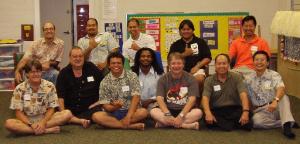The men of the Hawaii early childhood education (ECE) community are once again coming together for a retreat on the Island of Oahu – traditionally referred to as “the Gathering Place.” [You can read about the success of the last retreat.]
The Hawaii Association for the Education of Young Children (HAEYC) Men in Education Network (M.E.N.) Interest Forum is sponsoring the 2006 M.E.N. Retreat on Saturday, August 26, 2006 in collaboration with MenTeach.org.
By employing methods outlined in Bryan Nelson’s NAEYC pdf bulletin: “How to Organize a Retreat for Men,” the 2006 M.E.N. Retreat offers male ECE professionals a chance to share personal experiences, exchange ideas, and hear diverse points of view.
[Editor’s Note: There is now a 16-page MenTeach Organizing Manual available for purchase that includes checklists and information,]
The 2006 M.E.N. Retreat will take place at the Aha Punanaleo O Waianae – a Hawaiian language and cultural immersion early childhood program. A significant challenge for any effort to examine male involvement in ECE is to ensure cultural sensitivity, particularly from the point of view of indigenous cultures who may not share child rearing and other values of a dominant culture. For example, several of the participants from the last retreat were surprised to hear that some of the men were really concerned about touching children. The Hawaiian men explained that touch is integral to the work they do and is assumed to be part of children and men’s daily lives.
The Hawaiian language nest teachers bring a global perspectives to discussions on contexts that support men who work directly with young children. For Hawaiians and many other indigenous people worldwide, the development of language immersion programs in their communities has helped bring, not only their language but culture, back from the brink of linguistic and cultural extinction; their success is inspiring!
Another example of the differences is that gender is essentially irrelevant in Hawaiian language nest early childhood programs as the whole of their “ohana” (Hawaiian for family and inclusive of the entire community that raises the children) sees their “kumu” (teachers) as front-line linguistic and cultural champions. Consequently, there can be nearly as many male as female teachers, extended family male involvement in school activities surpasses what is typical, and the number of men who take an active role in ECE school governance is significant higher than elsewhere in the field of ECE.
Intended learning outcomes for the 2006 M.E.N. Retreat include:
1) Exchanging knowledge, ideas, and personal experiences with other men about working with young children.
2) Knowing and understanding how to develop a network of men and women who support the many roles of men in ECE.
3) Identifying specific topics and areas of interest for men in ECE.
4) Creating lesson, art, dance, story, or song to take home to share with fellow workers and children.
5) Other outcomes of attendees’ choosing.
NAEYC interest forums are defined as groups of members who share a common area of concern related to the organization’s mission, and who desire to network, reflect and learn together.” (Young children; V59 No. 6; pp. 83-94). The company of other male professionals can reduce feelings of isolation that are common threads for many men in ECE, yet all who work with young children do so in part because they are of a generally playful nature.
Play, games, learning, and physical activities are intentionally included to encourage retreat participants to relax, enjoy themselves, and get to know other male ECE professionals.
Look for a report in coming months!

